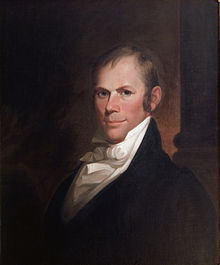Henry Clay | |
|---|---|
 Henry Clay 1818 portrait by Matthew Harris Jouett | |
| 8th, 10th and 13th Speaker of the United States House of Representatives | |
| In office March 4, 1823-March 4, 1825 March 4, 1815-October 28, 1820 | |
| 9th United States Secretary of State | |
| In office March 4, 1825 – March 4, 1829 | |
| Preceded by | John Quincy Adams |
| Succeeded by | Martin Van Buren |
| United States Senator from Kentucky | |
| In office March 5, 1849-June 29, 1852 November 10, 1831-March 31, 1842 | |
| Member of the U.S. House of Representatives from Kentucky's 3rd district | |
| In office March 4, 1823-March 4, 1825 | |
| Member of the U.S. House of Representatives from Kentucky's 2nd district 3rd district (1811–1813) | |
| In office March 4, 1815-March 3, 1821 March 4, 1811-January 19, 1814 | |
| Personal details | |
| Born | thumb April 12, 1777 Hanover County, Virginia |
| Died | June 29, 1852 (aged 75) Washington, D.C. |
| Resting place | thumb 200 px |
| Political party | Democratic-Republican National Republican Whig |
| Spouses | Lucretia Hart Clay |
| Children | Henrietta, Theodore, Thomas, Susan, Anne, Lucretia, Henry, Jr., Eliza, Laura, James Brown Clay, and John Morrison Clay |
| Parent |
|
| Alma mater | College of William and Mary |
| Profession | Law |
| Signature |  |
Henry Clay, Sr. (April 12, 1777 – June 29, 1852), was a lawyer, politician and skilled orator who represented Kentucky separately in both the Senate and in the House of Representatives. He served three different terms as Speaker of the United States House of Representatives and was also Secretary of State from 1825 to 1829.
Clay was a dominant figure in both the First and Second Party systems. As a leading war hawk, he favored war with Britain and played a significant role in leading the nation to war in 1812.[1] He was the foremost proponent of the American System, fighting for an increase in tariffs to foster industry in the United States, the use of federal funding to build and maintain infrastructure, and a strong national bank. He opposed the annexation of Texas, fearing it would inject the slavery issue into politics. Clay also opposed the Mexican-American War and the "Manifest Destiny" policy of Democrats, which cost him votes in the close 1844 election.
Dubbed the "Great Compromiser," Clay brokered important compromises during the Nullification Crisis and on the slavery issue. As part of the "Great Triumvirate" or "Immortal Trio," along with his colleagues Daniel Webster and John C. Calhoun, he was instrumental in formulating the Missouri Compromise of 1820 and the Compromise of 1850. He was viewed as the primary representative of Western interests in this group, and was given the names "Henry of the West" and "The Western Star."[2] A plantation owner, Clay held slaves during his lifetime but freed them in his Will.[3]
Abraham Lincoln, the Whig leader in Illinois, was a great admirer of Clay, saying he was "my ideal of a great man." Lincoln wholeheartedly supported Clay's economic programs.[4] In 1957, a Senate Committee selected Clay as one of the five greatest U.S. Senators, along with Daniel Webster, John C. Calhoun, Robert La Follette, and Robert Taft.[5]
- ^ Eaton, Clement (1957). Henry Clay and the Art of American Politics. Boston, MA: Little, Brown and Company. p. 25.
- ^ Eaton, Clement (1957). Henry Clay and the Art of American Politics. Boston, MA: Little, Brown and Company. pp. 22, 26.
- ^ Cite error: The named reference
Biography.com on Henry Claywas invoked but never defined (see the help page). - ^ Shearer Davis Bowman, "Comparing Henry Clay and Abraham Lincoln," Register of the Kentucky Historical Society. 106 (Summer–Autumn 2008), 495–512.
- ^ "The "Famous Five"". Retrieved 2007-01-29.